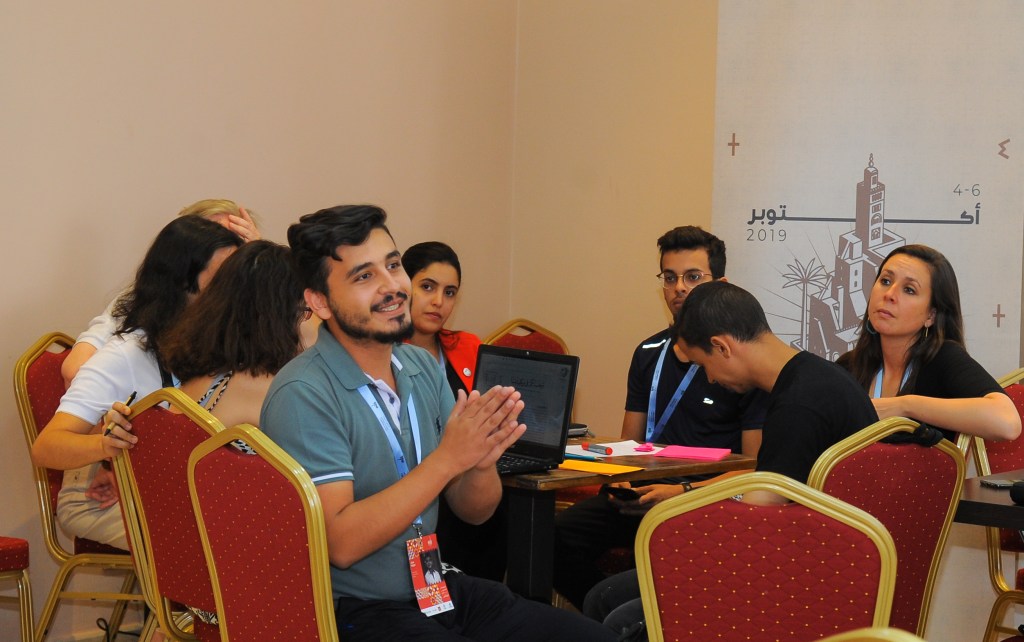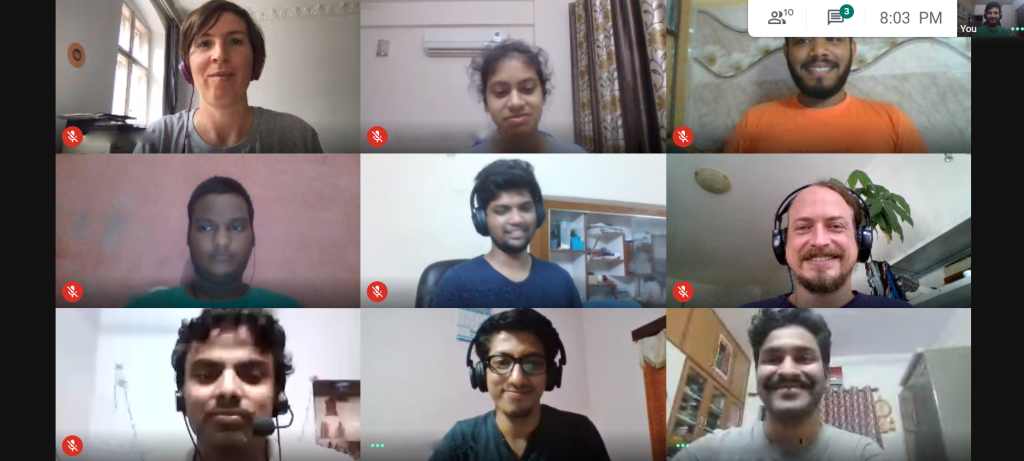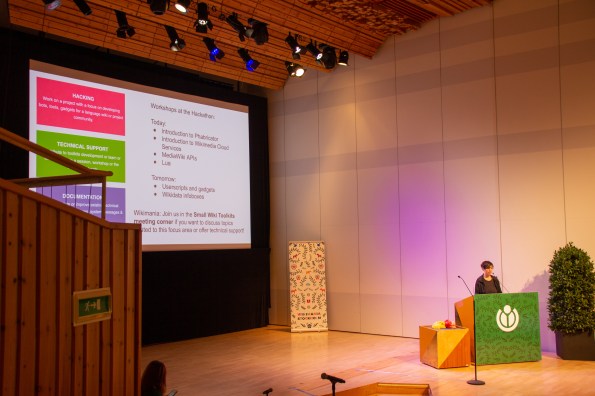
Overview
Small Wiki Toolkits is an initiative that focuses on building technical capacity in smaller language wikis and a global community of practice for discussing and resolving the challenges of these wikis.
The Wikimedia projects are powered by the MediaWiki software and extensions. Community-built tools, bots, gadgets and templates enhance the software experience and support a variety of workflows. A visible example in the user interface is an infobox, which is generated through templates. Tools, bots, templates and gadgets play an essential role for the curation, maintenance and growth of content. Technical contributors across wikis perform a wide variety of tasks, such as site configuration requests (e.g. adding a custom namespace, changing a logo), importing gadgets and templates, software development, documentation, reporting bugs and translating technical news.
About 1/3 of the total edits to the Wikimedia projects come from tools and bots that help wikis with site maintenance, content moderation, editing, etc. Most of them are using the Wikimedia Cloud Services (WMCS) infrastructure. In the screenshot below, you can see that 7.5% of Punjabi wiki’s edits came from the tools and bots that are hosted via WMCS in March of 2020. To develop and use impactful tools and workflows, communities need technical contributors. Hence the initiative–Small Wiki Toolkits seeks to support smaller wikis that cannot address unmet technical needs by developing toolkits and recommendations on technical topics and organizing workshops to equip people with the necessary skills to make their work on wikis easier and more effective.

This initiative was kicked off at Wikimania last year. Since its inception, over 200 people have participated in 16 informational sessions, technical workshops, and group discussions through 6 Wikimedia events (local, regional, and international) online and offline. Through these events, the initiative engaged people from many smaller wikis from all over the world.
Activities and highlights
Let’s take a look at the different formats that the initiative experimented with in its first year:
Brainstorming sessions to understand the technical challenges smaller wikis face.
In a typical brainstorming session, participants would discuss the situation in their wiki community, problems they would like to solve as a technical contributor and missing gaps in their workflows (tools, processes, skills, etc.). Participants shared ideas for how to enable more people to do technical work and get better at working together across wikis. Five such group discussions helped gather challenges and ideas for possible solutions from around 30 smaller language wikis including Breton, Macedonian, Basque in the European region, Indic, Arabic and indigenous language wikis from the North American region.

In a nutshell, challenges reported were:
- Lack of awareness and knowledge to use tools and technologies (e.g., anti-vandalism tools, bots, Phabricator for bug reporting, etc.)
- Lack of specific technical skills (e.g., connecting infoboxes to Wikidata, using Lua modules, using templates, etc.)
- It’s hard to keep up with new changes that break the wikis
- It’s difficult to handle cumbersome wiki workflows (e.g., importing templates or gadgets from one wiki to another)
- Lack of technical resources in different languages
- Localization/ translation issues in many areas
In these conversations, people from a few wikis that are just getting started and working to grow content also participated. To address the needs of such wikis currently feels out of the scope of this initiative. Small Wiki Toolkits is focusing on smaller wikis that have reached a tipping point in their content development and are now looking for technical help to expand further. In these sessions, connections were made between participants from different wikis to collaborate on longstanding issues. Also, some sessions surfaced success stories; for example, immediately after one such session, a community member felt encouraged to apply for global interface rights and received it.
Technical workshops and informational sessions
The Small Wiki Toolkit’s initiative’s members developed and curated a few teaching and learning resources on a wide variety of technical topics. These were documented on the Small wiki toolkits’ landing page on meta-wiki. There were also guidelines developed for individuals interested in developing the toolkits, keeping in mind that potential trainers and learners might utilize them and should have a lot of notes in the slides.
Ten workshops were conducted on eight technical topics: developing user scripts and gadgets, working with Wikimedia APIs, writing templates in Lua, generating Wikidata infoboxes, leveraging Wikimedia cloud services, translating pages via the Translate extension, writing Wikidata queries, using Phabricator, etc. Out of these ten workshops, seven were part of the 2019’s Wikimania and remaining of a workshop series designed specifically for the Indic community. Some topics were selected based on the needs of community members gathered through a survey.

One of the participants at Wikimania live-tweeted a workshop:
These workshops showed promising results. Attendees seemed to be engaged and gained mastery in a topic. As per the Indic workshop series report, participants’ skills and awareness in technical areas increased by 30% on average.
Two participants provided feedback:
The session was useful and moreover it was in Hinglish (A mix of Hindi and English), and I feel it was more adaptive for me to understand. The workshop started with the basics, which really helped me. Workshop was so interesting that some of the attendees were eager to learn more even after workshop time limits. I think it should not [be limited] to one session.
Overall experience of [the] workshop was excellent, and I would say that such [a] kind of workshop should be organised frequently.
Starter kit for smaller language wikis
One of the solutions proposed in response to the technical challenges during a brainstorming session was to develop a set of resources, tools, recommendations in technical areas relevant to smaller wikis that are just getting started. With continuous feedback from experts from many different wikis, the Small Wiki Toolkit initiative developed a starter kit for smaller language wikis. After receiving final feedback from participants of the Celtic Knot Conference 2020, it was released and announced on the mailing lists. Overall, the starter kit received a good response, and since it was published, it has been viewed 1,234 pageviews, with a daily average of 41.
Looking ahead
The Small Wiki Toolkit initiative identified a vast technical skill gap in small wiki communities. These communities need to rely on outside experts to address technical issues. A post-workshop series survey reflected the participants’ continued interest in attending workshops.
For the second year, the initiative is planning monthly technical skill-sharing workshops for the smaller wikis, beginning with the South Asian region, in which there are eight countries. This project will be a collaboration between the Indic-TechCom and the Wikimedia Foundation’s Developer Advocacy team. These workshops will allow participants to exchange challenges in the brainstorming session format discussed above, learn new skills, and connect with members from other communities. Exploring use cases and needs for automation, and a program around developing and running bots are further topics under consideration.
Another experimental idea is to allow community members who are interested in attending the technical workshop to take a prerequisite course via an external course provider and obtain a certificate for it. For example, for writing user scripts and gadgets, one must be familiar with JavaScript & JQuery fundamentals. Without prior knowledge of these topics, for a novice programmer, the learning curve to jump straight into the user script topic could be very high. And, this idea would help reduce it.
If you are interested in joining and supporting the Small Wiki Toolkits initiative, please add your name to the members list. Ideas and feedback are welcome on the talkpage of the initiative.
Srishti Sethi, Senior Developer Advocate, Wikimedia Foundation

Can you help us translate this article?
In order for this article to reach as many people as possible we would like your help. Can you translate this article to get the message out?
Start translation